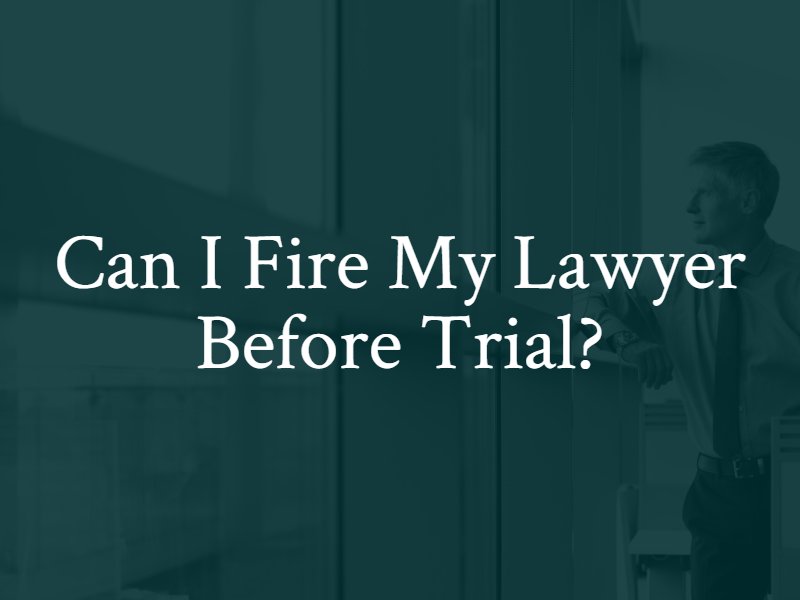Can I Fire My Lawyer Before Trial?
Can I Fire My Lawyer Before Trial?
Many situations can make clients feel tempted to fine a new lawyer, but it’s vital to weigh this decision carefully. Firing your attorney can delay your legal process, and repeatedly changing attorneys during a personal injury case may result in a less favorable impression with the judge.
If you are considering firing your attorney and finding new legal counsel, you need to keep in mind a few things. Depending on your reasons for wanting to fire your current lawyer, the process will work in different ways.

Deciding to Fire Your Personal Injury Lawyer
Valid Reasons to Consider Before Hiring a New Attorney
Only a few situations should make you want to consider changing lawyers. Let’s say you and your attorney disagree on case strategy or specific elements of your case, but there has been no illegal or unethical activity.
In this case, you should approach your separation from your attorney as professionally as possible. Good lawyers value their reputations, so you should expect professionalism if you engage the topic professionally.
If an attorney engages in any illegal or unethical behavior, you may wish to refer to the attorney’s bar association. Otherwise, you should carefully consider your reasons for wanting to fire your lawyer. In some cases, the client may believe it will be a smooth transition, but the attorney understands the inner workings of the case.
This may frustrate some clients, but the attorney should be able to explain his or her reasoning for any decision that agitates the client.
Communication is Key
If you feel your personal injury lawyer seems to always be unavailable to answer your calls or questions, consider whether or not your expectations are realistic and it’s an overall valid reason.
Your attorney may handle several cases at once and need to coordinate court appearances, depositions, and other appointments with clients.
Understanding Legal Processes
Most legal cases are very time-consuming, and your attorney may be waiting for the court’s permission or information that is beyond his or her control.
Communication is the key to any successful attorney-client relationship. If you can’t get in touch with your attorney, the attorney’s secretary can likely pull the case files and provide you with an update on the status of your case.
Getting New Legal Representation: What to Consider
Beware of a New Lawyer Client Poaching
If another lawyer approaches you and attempts to poach your case from your current attorney, you may want to rethink you putting in your termination notice.
Client poaching is very unethical, and an attorney who is willing to participate in unethical behavior to secure your case may also be willing to jeopardize your case with other unethical or illegal actions.
Potential Challenges
Some attorneys may hesitate to accept a case from a previous attorney for several reasons. For example, if you fired an injury lawyer who spent a year working on your case, your next personal injury attorney will need to catch up on a year’s worth of past work.
If you have a history of repeatedly firing attorneys, the judge hearing your case may grow frustrated and believe you are purposefully interfering with court proceedings and wasting time and resources.
Financial Considerations
You will also need to consider the cost of firing your attorney. If you hired a lawyer on a contingency-fee basis, the lawyer will likely be able to claim against your case for the time spent working on it.
This could take the form of a percentage of the total award or an hourly rate for time spent on your case. You will have to pay this to the fired attorney and then consider billing with the new attorney.
Legal Malpractice Considerations
If an attorney engaged in any blatantly illegal or unethical behavior, the lawyer’s bar association can confirm this. In some cases, you may wish to pursue legal representation to continue your current case and also explore your options for a legal malpractice case against the first attorney. This is only possible if the first lawyer’s actions were illegal, unethical, or had a negative impact on your original claim.
Talk to a Lawyer About Your Situation Today
Are you considering firing your lawyer or dealing with potential legal malpractice? Don’t try to do this alone.
Contact Bentley & More LLP today for a confidential consultation. Our experienced team of attorneys can help you understand your rights and options, so your legal interests are protected every step of the way. Contact us to schedule your free case evaluation.


